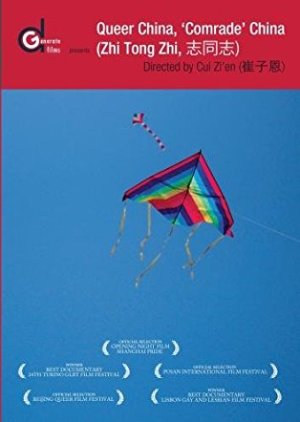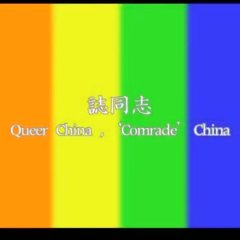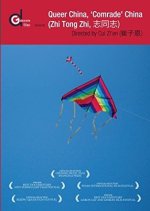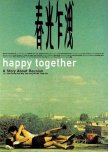This documentary reviews and summarizes the development of homosexuality as an issue in the past three decades in China. We interviewed thirty prominent figures in the gay community, who have experienced the changes of views and lifestyles regarding homosexuality. Edit Translation
- English
- magyar / magyar nyelv
- dansk
- Norsk
- Native Title: 志同志
- Also Known As: Zhi Tong Zhi , 誌同志
- Screenwriter & Director: Cui Zi En
- Genres: Documentary
Where to Watch Queer China, 'Comrade' China
Purchase (sub)
Reviews

This review may contain spoilers
Universal story
Can I say I was a bit disappointed in this film? I expected more or different, and I found things I've already seen elsewhere!Let me explain myself!
The documentary tells the story of homosexuality in modern China (from 1949) through interviews with activists, professors, journalists and artists. And it tells a very familiar story, reminiscent of what the west went through. Homosexuality had been banned, outlawed, punished, people have been ostracized, beaten, pushed into hiding. Slowly the laws changed, society's perceptions changed, decriminalizing sodomy and eventually homosexuality at the end of 20th century. At the same time HIV/AIDS epidemic struck China with its full force and the government had to do something in order to slow it down: prevention, condoms etc. This made the LGBT people more visible. The economic growth opened China, the people were given a taste of liberty and they used it to put forward the idea that gay people (or tongzhi) are just humans like everyone else. Gays and lesbians organized themselves into clubs and then they opened bars and gained more and more tolerance. These clubs were also used to promote protection and prevention from AIDS. There were classes at the universities in social studies about homosexuality, film festivals were organized, art exhibitions as well. The backlash from authorities seems to have been minimal. The movie ends on a high note. By 2008, the acceptance of LGBT community in China was high and they were even fighting for equal marriage (even though the majority of people interviewed here were against it saying why should they mimic heterosexuals?!?!?).
I do not know much about China but I expected this to show us a different story. It didn't! Should it be a comfort to know that we in the west went through the same motions as they did? Maybe! This is just to show that no matter which country, they were all at one time intolerant of different sexuality.
This film is divided in 8 parts, each covering a subject connected with the LGBT history with poetic titles like "From Pitch Black To Light Grey", "From Parks to Grassroots" etc. explaining the evolution of chinese society's views on homosexuality. There are some interesting interviewees: a 70yr old gay man talking about his recent promiscuity or the youngish blogger spending time proudly outing people who do not want to be outed who were the extremes (just to show us they do exist) while the majority were university professors, lawyers and activist.
What happened next? I wager that the story is different today! I would love to see a documentary about the last 15 years in China!
Was this review helpful to you?

This review may contain spoilers
An important and comprehensive historical record of the queer movement in modern China
Directed in 2009 by Cui Zi En, China's most prolific celebrated gay filmmaker, 'Queer China, "Comrade" China' documents the history of the queer community in the People's Republic of China from the 1984s to the 2000s.Premiered on the opening night of the 2009 Shanghai Queer Film Festival (Festival that carried that name until 2012, but as of 2016 began to be called ShanghaiPRIDE Film Festival), the first LGBT pride festival instituted in China and second in importance in the Asian nation After the Beijing Love Queer Cinema Week (previously Beijing Queer Film Festival, since 2001), the documentary 'Queer China, Comrade China' was recognized as the most authoritative account of the story queer culture in China to date.
Presented at the Vancouver International Film Festival and Busan International Film Festival in 2009, the film uses a chapter structure (like a history book) to document advances in rights, literature and the arts, community and LGBT+ activism in this long period of that nation's history.
Through many exclusive interviews with more than three dozen prominent queer activists, academics and filmmakers, including Cui Zi En himself, Shi Tou, Li Yinhe and Zhang Yuan, as well as the use of historical archival material, the documentary becomes a record important and comprehensive history of the queer movement in modern China.
China's leading queer theorist, activist and academic includes rarely seen footage of the first appearance of gays and lesbians on Chinese state television in the documentary, including several featuring the documentary film's director himself.
'Queer China, "Comrade" China' documents the changes and developments in lesbian/gay/bisexual/transgender culture that have taken place in China over the past 80 years up to the time of its release.
Like never before, this film explores the historical milestones and ongoing advocacy efforts of the Chinese LGBT community.
The film examines how changing attitudes in the law, media and education have transformed queer culture from an unspeakable taboo to an accepted social identity.
The film culminates with the submission of Dr. Li Yinhe's same-sex marriage bill to the Legislative Affairs Commission of the National People's Congress of China, the highest legislative body of the People's Republic of China in 2003, a milestone important in the fight for the acceptance of queer identity in China.
Was this review helpful to you?
Recommendations
There have been no recommendations submitted. Be the first and add one.


































